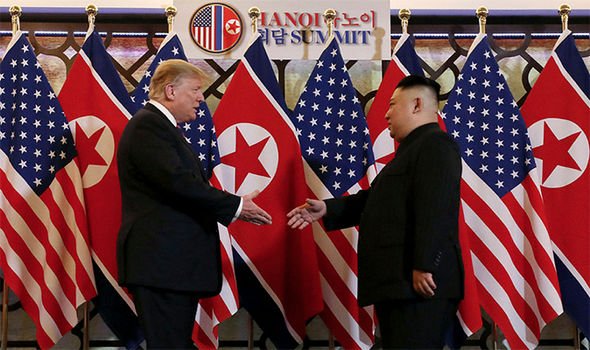|

If the administration’s explanation of the Trump-Kim summit collapse is accurate — that is, if President Trump walked away from talks due to Kim Jong Un’s insistence that all sanctions be dropped as a condition for the dismantlement of one nuclear site — this raises an important question: did Kim badly misread President Trump or did Kim want the talks to fail?
If Kim did misread Trump, we can likely trace that failure to last year’s Singapore summit. For in Singapore, the president did not prove himself the tough negotiator he claims to be. The joint declaration was a vaguely worded, poorly constructed document in which North Korea gave up little and agreed to fewer concessions than it had in previous rounds of diplomacy. President Trump’s unexpected decision to call off US-South Korea military exercises at Kim’s request, surprising the president’s top advisors and in contravention of their advice, may have only reinforced a North Korean conclusion that the president is an easy mark.
Heading to Hanoi, Kim may well have expected he could once again get the better of the American president and may not have been prepared for an actual negotiation in which his starting (and apparently only) offer would be rebuffed.
On the other hand, the Trump administration has been consistent in insisting sanctions would remain until complete denuclearization is achieved. Recent reporting has suggested that the administration would be willing to provide some room for greater North Korean economic engagement with the outside world — particularly with South Korea — but, to anybody paying attention, it would have been truly shocking for the Trump administration to drop all sanctions in return for Yongbyon’s dismantlement. Presumably the North Koreans have been paying attention.
If Kim did understand that dropping all sanctions was going to be a bridge too far, then he went into the summit intending for it to collapse. Why might he have wanted talks to fall apart? There are a few possible reasons.
First, he may simply be playing for more time. We know that North Korea has continued work on nuclear and missile technology even as there has been a halt to testing. There’s also little reason to believe Kim is actually willing to denuclearize, as the US intelligence community has made clear. He may, however, be up for an arms control agreement and looking to maximize the size of his arsenal before concluding one.
Moreover, Kim may have correctly calculated that the Hanoi summit could fail without the Trump administration returning to an emphasis on the “maximum pressure” pillar of its “maximum pressure and engagement” strategy. Indeed, after calling a premature end to the meetings in Hanoi, the Trump administration has insisted that the discussions were productive and will continue. What’s more, with Russia and China having already eased off sanctions enforcement and called for their removal and South Korea eager to launch a variety of inter-Korean economic initiatives, Kim knows it would be difficult for Washington to once again ramp up the international pressure on Pyongyang. The international consensus on punishing and isolating North Korea, which the United States worked so hard to build during 2017, is a thing of the past.
Alternatively, a Kim decision to intentionally tank the talks could be primarily driven by politics in Pyongyang. It is possible that there is elite concern that Kim will give up too much in negotiations with the United States. By blowing up the talks with an unbending maximalist position, Kim may have sought to prove to skeptical elites that North Korea cannot bust free of the sanctions regime without some concessions, thus making a more limited deal somewhere down the line more palatable (assuming sanctions relief is generally accepted as a priority within the regime).
More generally, if elite politics in Pyongyang is less stable than it may seem — the Wall Street Journal recently reported on a significant purge in recent months, including of officials opposed to Kim’s approach to the United States — Kim may have torpedoed the Hanoi summit to ensure that hardliners would not have room to outflank him at home.
Importantly, none of these explanations for intentionally killing the talks are mutually exclusive. Other explanations are possible as well.
One thing is clear. North Korea’s nuclear weapons program is more developed than it was a year ago, and more entrenched. And senior officials in neither Washington nor Seoul seem all that concerned. Props to Kim Jong Un on a job well done.
|



